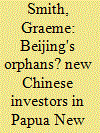| Srl | Item |
| 1 |
ID:
120198


|
|
|
|
|
| Publication |
2013.
|
| Summary/Abstract |
This paper will explore the perspectives and narratives developed by three different sets of Chinese investors in Papua New Guinea (PNG): investors in the retail, mining, and construction sectors. It is estimated that 90 per cent of new Chinese private investors in the PNG retail sector hail from Fuqing, a coastal community in Fujian province with a long history of transnational migration. Larger state-owned mining ventures and construction companies draw on a more disparate workforce, even though they are headquartered in Beijing. All three sets of investors face different degrees of stigmatization from their competitors, the media, and different Chinese and local actors. Based on interviews with Chinese investors in PNG and China, and drawing on Chinese scholarly studies, this paper will explore the interaction of these three groups of investors with Chinese state and non-state actors, and evaluate how this shapes the process of "localization." The paper will examine how relations with state and non-state actors in PNG are evolving over time, as both groups find ways to "get things done" in a country where mainland Chinese investors have a short history of engagement.
|
|
|
|
|
|
|
|
|
|
|
|
|
|
|
|
| 2 |
ID:
114082


|
|
|
|
|
| Publication |
2012.
|
| Summary/Abstract |
This article investigates how corporate social responsibility (CSR) is operated inChinawith a particular focus on the role of the government. It finds that CSR in China is implemented through two big networks: one for foreign invested enterprises, mostly consisting of voluntary initiatives targeting Chinese domestic consumers, and the other of domestic stateowned enterprises (SOEs), implementing non-voluntary, governmentdriven initiatives mostly targeting foreign markets. The role of the government is especially critical in the latter network. The government has developed a national strategy to encourage SOEs to promote CSR by issuing guidelines, providing various kinds of support for research and conventions, and developing China's own reporting standards in certain industries. Government intervention has resulted in the creation of two separate worlds of CSR and a Chinese version of government-led CSR in which the role of civil actors such as nongovernmental organizations is seriously limited.
|
|
|
|
|
|
|
|
|
|
|
|
|
|
|
|
| 3 |
ID:
153576


|
|
|
|
|
| Summary/Abstract |
In this article we trace the history of state-owned enterprise (SOE) reform in Laos. Commencing in 1986, SOE reform was a component of the New Economic Mechanism (NEM), a program of changes that moved the economy toward one based on market principles. SOE reform is located within the broader reforms associated with the NEM and is divided into three distinct phases. We present and analyze a case study of the reform of the national electricity company (Électricité du Laos) in terms of a stages model of power sector reform. The overall findings show the importance of context in influencing the specific nature of SOE reform.
|
|
|
|
|
|
|
|
|
|
|
|
|
|
|
|
| 4 |
ID:
103914


|
|
|
|
|
| Publication |
2011.
|
| Summary/Abstract |
We extend the current empirical literature on privatization by exploring the effect of ultimate privatization on the performance of Chinese listed companies. Ultimate privatization is defined as the incidence of transferring the ultimate control of a state-owned company from the government to private owners. Using a sample of 127 Chinese listed companies that have had controlling blocks transferred from the government to private owners, we show that firm performance improved significantly following this transfer. In addition, gains in profitability and efficiency are more prominent when the new controlling shareholder is an "outsider", one who does not own shares in the company prior to the transfer of control. Our results suggest that the Chinese government should continue to reduce its controlling ownership in listed companies, as the transfer of control to private owners enhances operating efficiency and profitability.
|
|
|
|
|
|
|
|
|
|
|
|
|
|
|
|